
Cyberpunk is a subgenre of science fiction in a dystopian futuristic setting that tends to focus on a "combination of lowlife and high tech", featuring futuristic technological and scientific achievements, such as artificial intelligence and cybernetics, juxtaposed with societal collapse, dystopia or decay. Much of cyberpunk is rooted in the New Wave science fiction movement of the 1960s and 1970s, when writers like Philip K. Dick, Michael Moorcock, Roger Zelazny, John Brunner, J. G. Ballard, Philip José Farmer and Harlan Ellison examined the impact of drug culture, technology, and the sexual revolution while avoiding the utopian tendencies of earlier science fiction.

Kevin Wayne Jeter is an American science fiction and horror author known for his literary writing style, dark themes, and paranoid, unsympathetic characters. He has written novels set in the Star Trek and Star Wars universes, and has written three sequels to Blade Runner. Jeter also gained recognition for coining the term "steampunks."
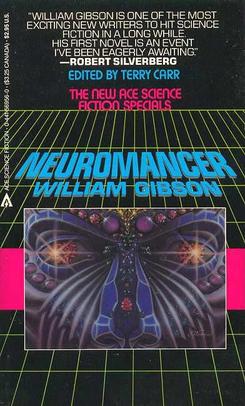
Neuromancer is a 1984 science fiction novel by American-Canadian writer William Gibson. Considered one of the earliest and best-known works in the cyberpunk genre, it is the only novel to win the Nebula Award, the Philip K. Dick Award, and the Hugo Award. It was Gibson's debut novel and the beginning of the Sprawl trilogy. Set in the future, the novel follows Henry Case, a washed-up hacker hired for one last job, which brings him in contact with a powerful artificial intelligence.

Philip Kindred Dick, often referred to by his initials PKD, was an American science fiction writer. He wrote 44 novels and about 121 short stories, most of which appeared in science fiction magazines during his lifetime. His fiction explored varied philosophical and social questions such as the nature of reality, perception, human nature, and identity, and commonly featured characters struggling against elements such as alternate realities, illusory environments, monopolistic corporations, drug abuse, authoritarian governments, and altered states of consciousness.

Do Androids Dream of Electric Sheep? is a dystopian science fiction novel by American writer Philip K. Dick, first published in 1968. The novel is set in a post-apocalyptic San Francisco, where Earth's life has been greatly damaged by a nuclear global war, leaving most animal species endangered or extinct. The main plot follows Rick Deckard, a bounty hunter who has to "retire" six escaped Nexus-6 model androids, while a secondary plot follows John Isidore, a man of sub-par IQ who aids the fugitive androids.

Patricia Oren Kearney Cadigan is a British-American science fiction author, whose work is most often identified with the cyberpunk movement. Her novels and short stories often explore the relationship between the human mind and technology. Her debut novel, Mindplayers, was nominated for the Philip K. Dick Award in 1988.

The Man in the High Castle (1962), by Philip K. Dick, is an alternative history novel wherein the Axis Powers won World War II. The story occurs in 1962, fifteen years after the end of the war in 1947, and depicts the life of several characters living under Imperial Japan or Nazi Germany as they rule the partitioned United States. The titular character is the mysterious author of a novel-within-the-novel entitled The Grasshopper Lies Heavy, a subversive alternative history of the war in which the Allied Powers are victorious.

Flow My Tears, the Policeman Said is a 1974 science fiction novel by American writer Philip K. Dick. The novel is set in a futuristic dystopia where the United States has become a police state in the aftermath of a Second American Civil War. The story follows genetically enhanced pop singer and television star Jason Taverner who wakes up in a world where he has never existed.

Richard Kingsley Morgan, is a British science fiction and fantasy author of books, short stories, and graphic novels. He is the winner of the Philip K. Dick Award for his 2003 book Altered Carbon, which was adapted into a Netflix series released in 2018. His third book, Market Forces, won the John W. Campbell Award in 2005, while his 2008 work Thirteen garnered him the Arthur C. Clarke Award.

Altered Carbon is a 2002 cyberpunk novel by the English writer Richard K. Morgan. Set in a future in which interstellar travel and relative immortality is facilitated by transferring consciousnesses between bodies ("sleeves"), it follows the attempt of Takeshi Kovacs, a former U.N. elite soldier turned private investigator, to investigate a rich man's death. It is followed by the sequels Broken Angels and Woken Furies.
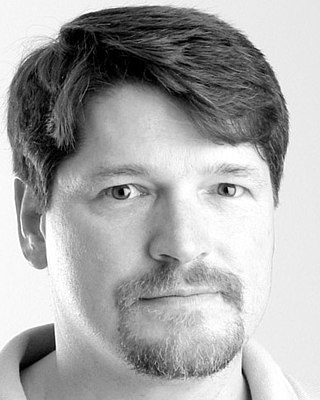
Bruce Bethke is an American author best known for his 1983 short story Cyberpunk which led to the widespread use of the term, including for the cyberpunk subgenre of science fiction. His novel, Headcrash, won the Philip K. Dick Award in 1995 for SF original paperback published in the US.

Ian McDonald is a British science fiction novelist, living in Belfast. His themes include nanotechnology, postcyberpunk settings, and the impact of rapid social and technological change on non-Western societies.
Since the advent of the cyberpunk genre, a number of derivatives of cyberpunk have become recognized in their own right as distinct subgenres in speculative fiction, especially in science fiction. Rather than necessarily sharing the digitally and mechanically focused setting of cyberpunk, these derivatives can display other futuristic, or even retrofuturistic, qualities that are drawn from or analogous to cyberpunk: a world built on one particular technology that is extrapolated to a highly sophisticated level, a gritty transreal urban style, or a particular approach to social themes.

Solar Lottery is a 1955 science fiction novel by American writer Philip K. Dick. It was his first published novel and contains many of the themes present in his later work. It was also published in altered form in the UK as World of Chance. The main story is about a man named Ted Benteley who lives in a strange world, dominated by percentages and the lottery. Lotteries are used to choose the next leader as well as a new assassin, whose job is to try to kill the leader or "Quizmaster". Everybody in society has the opportunity to be selected as a leader or an assassin. Benteley unexpectedly gets chosen to be a member of the committee trying to assassinate the new Quizmaster and he must decide what he is going to do.

A Maze of Death is a 1970 science fiction novel by American writer Philip K. Dick. Like many of Dick's novels, it portrays what appears to be a drab and harsh off-world human colony and explores the difference between reality and perception. It is, however, one of his few to examine the human death instinct and capacity for murder and is one of his darkest novels.
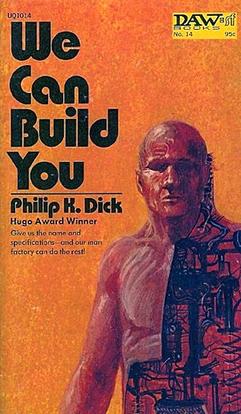
We Can Build You is a 1972 science fiction novel by American writer Philip K. Dick. Written in 1962 as The First in Our Family, it remained unpublished until appearing in serial form as A. Lincoln, Simulacrum in the November 1969 and January 1970 issues of Amazing Stories magazine, re-titled by editor Ted White. The novel was issued as a mass market paperback original by DAW Books in 1972, its final title provided by publisher Donald A. Wollheim. Its first hardcover edition was published in Italy in 1976, and Vintage issued a trade paperback in 1994.
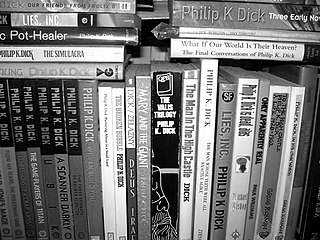
The bibliography of Philip K. Dick includes 44 novels, 121 short stories, and 14 short story collections published by American science fiction author Philip K. Dick during his lifetime.

Dr. Adder is a dark science fiction novel by American writer K. W. Jeter, set in a future where the United States has largely broken down into reluctantly cooperating enclaves run by a wide variety of strongmen and warlords, with a veneer of government control that seems largely interested in controlling technology. Dr. Adder is an artist-surgeon, who modifies sexual organs of his patients to satisfy the weirdest of perversion; he is clearly depicted as a partly criminal, partly counter-cultural figure in a future Los Angeles which anticipates the cyberpunk idea of the Sprawl trilogy.
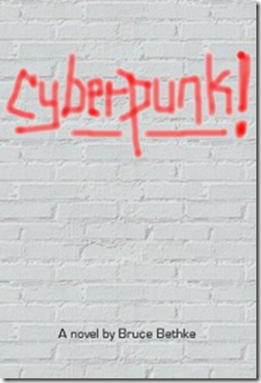
"Cyberpunk" is a science fiction short story and novel written by Bruce Bethke in 1980, published November 1983 in Amazing Stories magazine, and published in novel form online. It is most famous for coining the word "cyberpunk", which came to be used to describe the media subgenre centered on rebellious use of technology under the science fiction archetype.


















